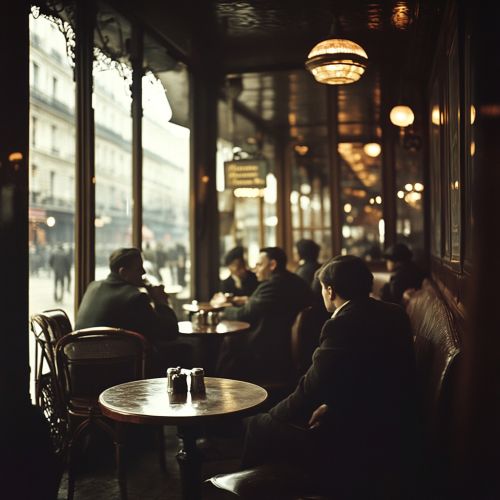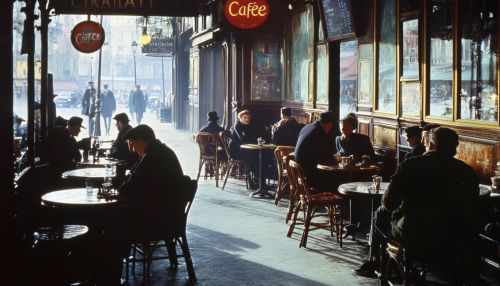The Lost Generation
Introduction
The term "The Lost Generation" refers to a cohort of writers and artists who came of age during World War I and were profoundly affected by the war's aftermath. This group is most famously associated with American expatriates living in Paris during the 1920s, including notable figures such as Ernest Hemingway, F. Scott Fitzgerald, Gertrude Stein, and T.S. Eliot. The term itself was popularized by Hemingway in his novel "The Sun Also Rises," where he attributes it to Stein, who reportedly heard it from a French garage owner referring to the disillusioned youth of the post-war era.
Historical Context
The Lost Generation emerged in the context of the First World War, a conflict that resulted in unprecedented levels of destruction and loss of life. The war's brutality and the subsequent disillusionment with traditional values and institutions led many young people to question the societal norms that had led to such devastation. This period was marked by a sense of existential uncertainty and a search for new meaning in a rapidly changing world.
The post-war years were characterized by significant social and cultural upheaval. The Roaring Twenties saw rapid industrialization, urbanization, and technological advancements, alongside a flourishing of the arts and a loosening of social mores. However, beneath the surface of prosperity and innovation lay a pervasive sense of disillusionment and anxiety, particularly among those who had experienced the war firsthand.
Literary Characteristics
The literature of the Lost Generation is marked by themes of disillusionment, alienation, and a quest for meaning in a world that seemed to have lost its moral compass. These writers often depicted characters who were adrift, struggling to find their place in a society that no longer adhered to the values they had been taught to believe in.
A hallmark of Lost Generation literature is its innovative narrative style. Many of these writers experimented with new forms of expression, breaking away from traditional literary conventions. Hemingway, for instance, is known for his sparse, economical prose and the use of the "iceberg theory," where the underlying themes and emotions are implied rather than explicitly stated. F. Scott Fitzgerald's work, on the other hand, often explored the themes of wealth, excess, and the American Dream, as exemplified in his novel "The Great Gatsby."
Cultural Impact
The cultural impact of the Lost Generation extended beyond literature. These writers and artists were part of a broader movement that sought to redefine art and culture in the wake of the war. They were heavily influenced by the avant-garde movements of the time, such as Cubism and Surrealism, and were instrumental in the development of modernist art and literature.
The expatriate community in Paris, often centered around the Left Bank, became a hub of intellectual and artistic activity. Cafés and salons served as meeting places for writers, artists, and thinkers to exchange ideas and collaborate on projects. This vibrant cultural scene was immortalized in Hemingway's memoir "A Moveable Feast," which provides a vivid account of life in Paris during this period.
Key Figures
Ernest Hemingway
Ernest Hemingway is perhaps the most iconic figure of the Lost Generation. His experiences as an ambulance driver during World War I profoundly influenced his writing, which often explores themes of courage, honor, and the human condition. Hemingway's novels, such as "A Farewell to Arms" and "For Whom the Bell Tolls," are considered classics of American literature and continue to be studied for their stylistic innovation and thematic depth.
F. Scott Fitzgerald
F. Scott Fitzgerald's work is synonymous with the Jazz Age, a term he coined to describe the exuberant, hedonistic spirit of the 1920s. His novel "The Great Gatsby" is a quintessential exploration of the American Dream and the moral decay that can accompany the pursuit of wealth and status. Fitzgerald's writing is characterized by its lyrical prose and keen social commentary, capturing the zeitgeist of an era marked by both prosperity and disillusionment.
Gertrude Stein
Gertrude Stein was a central figure in the Parisian avant-garde scene and served as a mentor and patron to many of the Lost Generation writers. Her salon at 27 rue de Fleurus was a gathering place for artists and writers, including Pablo Picasso and Henri Matisse. Stein's experimental writing style, as seen in works like "Tender Buttons," challenged conventional narrative structures and influenced the development of modernist literature.


Themes and Motifs
The Lost Generation's literature often grapples with themes of existential despair and the search for identity in a fragmented world. This is reflected in the recurring motif of the "lost" protagonist, who is often depicted as a wanderer or expatriate, seeking meaning and belonging in an alien environment.
Another prevalent theme is the critique of materialism and the hollowness of the American Dream. This is particularly evident in Fitzgerald's work, where characters pursue wealth and status at the expense of personal fulfillment and moral integrity. The tension between appearance and reality, and the disillusionment that follows the realization of this disparity, is a central concern of Lost Generation literature.
Influence on Modernism
The Lost Generation played a pivotal role in the development of Modernism, a cultural movement that sought to break away from traditional forms of art and literature. Modernist writers and artists rejected the notion of a coherent, objective reality, instead embracing fragmentation, ambiguity, and subjectivity as means of exploring the complexities of human experience.
The experimental narrative techniques employed by Lost Generation writers, such as stream of consciousness and unreliable narrators, were instrumental in shaping the modernist literary canon. These innovations challenged readers to engage with texts in new ways, encouraging a more active and interpretive approach to literature.
Legacy
The legacy of the Lost Generation extends far beyond the confines of the 1920s. Their exploration of themes such as alienation, disillusionment, and the search for meaning continues to resonate with readers and writers today. The works of Hemingway, Fitzgerald, and their contemporaries remain staples of literary study, offering insights into the human condition and the cultural upheavals of the early 20th century.
Moreover, the Lost Generation's influence can be seen in subsequent literary movements, such as the Beat Generation and Postmodernism, which similarly grapple with themes of identity, alienation, and the critique of societal norms. Their pioneering spirit and willingness to challenge conventions have left an indelible mark on the landscape of modern literature.
